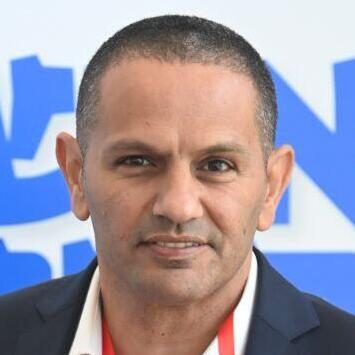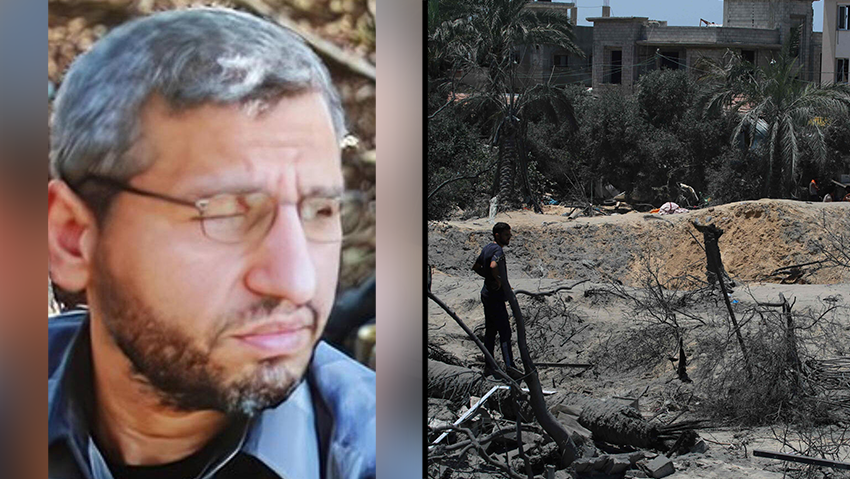Getting your Trinity Audio player ready...
These remarks are written with the necessary caution given the possibility that Israel has successfully eliminated Hamas military chief Mohammed Deif this time.
If confirmed, this would be the most significant achievement since the start of the war—a point acknowledged even by senior military and Shin Bet officials, who admit that this effort comes very late. Their failure to reach Deif and Sinwar until now is seen as a professional shortcoming.
There have been other recent assassination attempts on Hamas leaders, with no confirmation yet on their survival or death. The latest target was Raed Saad, approximately three weeks ago.
Much has been written about Deif and the attempts on his life. If this operation succeeded, it would be a severe blow to Hamas. Deif, a symbol, built Hamas' military wing, transforming it from a militia into an organized army capable of surprising Israel with the Al-Aqsa Flood offensive. Over the years, Deif has been a vocal advocate of this strategy.
He is also considered the "Protector of Jerusalem," known for uniting various fronts in May 2021 when he launched rockets at Jerusalem, leading to Operation Guardian of the Walls. That event, too, was a missed intelligence opportunity for Shin Bet and the IDF. Strategically, it was significant because Deif and Sinwar managed to unite the fronts, triggering a wave of terror in Jerusalem, the West Bank, among Israeli Arabs and Hamas' Lebanon branch.
Therefore, when discussing potential responses now, the defense establishment is also looking at the West Bank, where Hamas cells exist, and Lebanon, from where rockets could be launched again at the north. Regardless, alert levels remain high as Israel is engaged in an open war on all fronts.
The assassination was an urgent preemptive strike. The intelligence on Deif's presence in the Khan Younis compound was very strong, precise and corroborated from multiple sources, becoming actionable overnight.
Just on Friday, two drones were intercepted on their way to Eilat; in the north, another assassination in Lebanon and rocket fire toward Israel injured four female soldiers, one of them seriously, in a Hezbollah barrage targeting Kiryat Shmona and its surroundings. "Deif's demise will have a profound impact on Hamas in the Gaza Strip, Hamas abroad and the Gazan street," said military officials.
The assassination was an urgent preemptive strike. The intelligence on Deif's presence in the Khan Younis compound was very strong, precise and corroborated from multiple sources, becoming actionable overnight. The IDF waited for several clear and unequivocal confirmations before carrying out the precise strike. There was also a concerted effort to ensure no hostages were present.
The IDF believes Hamas will try to conceal the strike's results and noted that there are more indications that Khan Younis Brigade Commander Rafa Salama was killed in the attack. The confirmation of his death came Sunday afternoon.
Salama was a very significant and dominant figure, coordinating Hamas' war effort with Sinwar and overseeing the hostage issue. The intelligence, after thorough cross-referencing, confirmed Deif's presence at the targeted site, an open and wooded area.
Senior officials said "The assassination will not affect the hostage deal. If anything, it will only cause a brief tactical delay, not a breakdown.
However, the most sensitive issue remains the hostage situation. All parties involved in the operation insist they thoroughly verified that no Israeli hostages were in the area before approving the strike. Regarding a future deal, an Israeli senior official said that the assassination "will expedite a deal."
Senior officials said "The assassination will not affect the hostage deal. If anything, it will only cause a brief tactical delay, not a breakdown. The pressure from eliminating senior leaders is significant in pushing toward a cease-fire. Even after the assassination of Marwan Issa, negotiations continued. It is expected that talks will resume within a few days."
Despite the resumption of negotiations, two significant issues remain unresolved. One is the movement of armed terrorists to northern Gaza, and the other is resolving the Philadelphi Corridor and Rafah crossing, and tunnel blockage.
On this issue, the defense establishment is more optimistic about reaching a solution with the Egyptians that will satisfy security concerns. If not, they can always resume fighting and quickly regain control of the route, as the 162nd Division has previously demonstrated.




